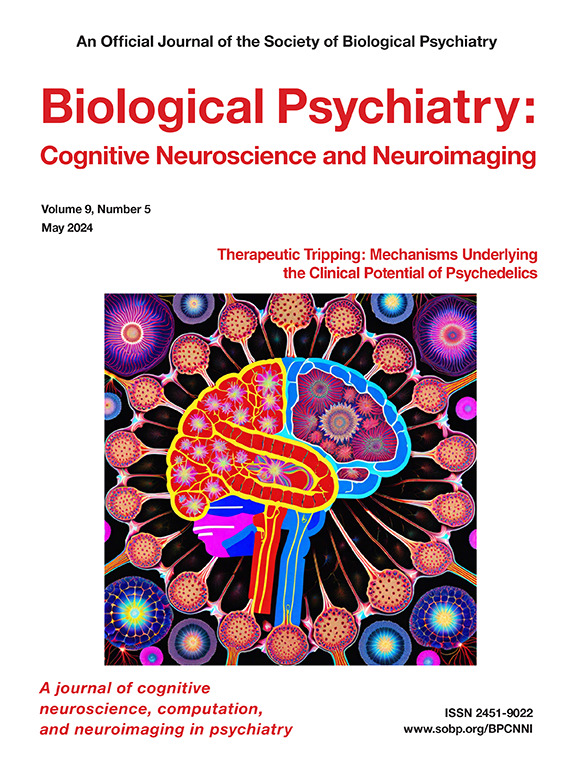Intranasal Oxytocin Improves Interoceptive Accuracy and Heartbeat-Evoked Potentials During a Cardiac Interoceptive Task
IF 5.7
2区 医学
Q1 NEUROSCIENCES
Biological Psychiatry-Cognitive Neuroscience and Neuroimaging
Pub Date : 2024-10-01
DOI:10.1016/j.bpsc.2024.05.004
引用次数: 0
Abstract
Background
Interoception represents perception of the internal bodily state, which is closely associated with social/emotional processing and physical health in humans. Understanding the mechanism that underlies interoceptive processing, particularly its modulation, is therefore of great importance. Given the overlap between oxytocinergic pathways and interoceptive signaling substrates in both peripheral visceral organs and the brain, intranasal oxytocin administration is a promising approach for modulating interoceptive processing.
Methods
Using a double-blind, placebo-controlled, between-participant design, we recruited 72 healthy male participants who performed a cardiac interoceptive task during electroencephalograph and electrocardiograph recording to examine whether intranasal administration of the neuropeptide oxytocin could modulate interoceptive processing. We also collected data in a resting state to examine whether we could replicate previous findings.
Results
The results showed that in the interoceptive task, oxytocin increased interoceptive accuracy at the behavioral level, which was paralleled by larger heartbeat-evoked potential amplitudes in frontocentral and central regions on the neural level. However, there were no significant effects of oxytocin on electroencephalograph or electrocardiograph during resting state.
Conclusions
These findings suggest that oxytocin may only have a facilitatory effect on interoceptive processing under task-based conditions. Our findings not only provide new insights into the modulation of interoceptive processing via targeting the oxytocinergic system but also provide proof-of-concept evidence for the therapeutic potential of intranasal oxytocin in mental disorders with dysfunctional interoception.
在心脏互感任务中,鼻内催产素可提高互感的准确性和心跳诱发电位。
背景:内感知代表对身体内部状态的感知,与人类的社会/情感处理和身体健康密切相关。因此,了解内感知处理的基本机制,特别是其调节机制非常重要。鉴于催产素能通路与外周内脏器官和大脑中的内感知信号底物之间存在重叠,鼻内注射催产素是一种很有前景的调节内感知处理的方法:在一项双盲、安慰剂对照、受试者间设计的研究中,72 名健康男性受试者在记录脑电图和心电图的过程中执行了一项心脏互感任务,以研究鼻内注射神经肽催产素是否能调节互感处理。我们还收集了静息状态下的数据,以检验我们是否能复制之前的研究结果:结果表明,在互感任务中,催产素在行为水平上提高了互感的准确性,而在神经水平上,前中枢和中央区域的心跳诱发电位振幅也随之增大。然而,催产素对静息状态下的脑电图或心电图没有明显影响:这些研究结果表明,催产素可能只在基于任务的条件下对互感加工有促进作用。我们的研究结果不仅为通过靶向催产素能系统调节知觉间处理提供了新的见解,还为鼻内催产素治疗知觉间功能障碍的精神疾病提供了概念证明。
本文章由计算机程序翻译,如有差异,请以英文原文为准。
求助全文
约1分钟内获得全文
求助全文
来源期刊

Biological Psychiatry-Cognitive Neuroscience and Neuroimaging
Neuroscience-Biological Psychiatry
CiteScore
10.40
自引率
1.70%
发文量
247
审稿时长
30 days
期刊介绍:
Biological Psychiatry: Cognitive Neuroscience and Neuroimaging is an official journal of the Society for Biological Psychiatry, whose purpose is to promote excellence in scientific research and education in fields that investigate the nature, causes, mechanisms, and treatments of disorders of thought, emotion, or behavior. In accord with this mission, this peer-reviewed, rapid-publication, international journal focuses on studies using the tools and constructs of cognitive neuroscience, including the full range of non-invasive neuroimaging and human extra- and intracranial physiological recording methodologies. It publishes both basic and clinical studies, including those that incorporate genetic data, pharmacological challenges, and computational modeling approaches. The journal publishes novel results of original research which represent an important new lead or significant impact on the field. Reviews and commentaries that focus on topics of current research and interest are also encouraged.
 求助内容:
求助内容: 应助结果提醒方式:
应助结果提醒方式:


